Nine
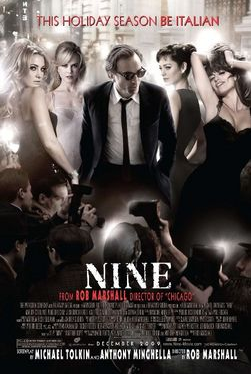
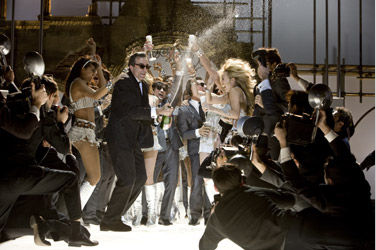 The movie is supposed to take us into the mind of Italian director, Guido Contini (Daniel Day-Lewis), as he struggles with his latest film and the various women who make up his life and his past. His newest film has wonderful costumes, a set, and a beautiful leading lady in the form of his current muse, Claudia (Nicole Kidman). What it does not have is a script. Instead of facing the problem head-on, Guido drives off to go into seclusion and smoke, drink, and engage in various affairs with his mistress (Penelope Cruz) and a reporter (Kate Hudson). No matter how far he runs, however, his life catches up with him. His producer and crew track him down, as does his long-suffering wife (Marion Cotillard), who was once a promising young actress, but now devotes herself to a man that she knows does not truly love him. As Guido tries to sort out both his professional and personal problems, he is haunted by visions of his past, which include his late mother (Sophia Loren), his Catholic upbringing, and his experiences as a child when he encountered a prostitute (Fergie).
The movie is supposed to take us into the mind of Italian director, Guido Contini (Daniel Day-Lewis), as he struggles with his latest film and the various women who make up his life and his past. His newest film has wonderful costumes, a set, and a beautiful leading lady in the form of his current muse, Claudia (Nicole Kidman). What it does not have is a script. Instead of facing the problem head-on, Guido drives off to go into seclusion and smoke, drink, and engage in various affairs with his mistress (Penelope Cruz) and a reporter (Kate Hudson). No matter how far he runs, however, his life catches up with him. His producer and crew track him down, as does his long-suffering wife (Marion Cotillard), who was once a promising young actress, but now devotes herself to a man that she knows does not truly love him. As Guido tries to sort out both his professional and personal problems, he is haunted by visions of his past, which include his late mother (Sophia Loren), his Catholic upbringing, and his experiences as a child when he encountered a prostitute (Fergie).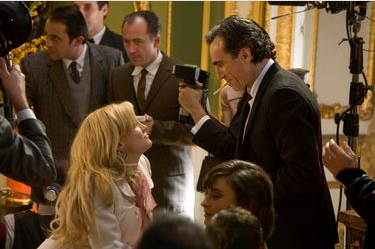 Nine sets itself up into a predictable formula quite quickly. We're introduced into a woman either from Guido's past or his present, and they sing their feelings about him in an elaborately staged musical number. Even his costume designer (Judi Dench) gets her turn in a cabaret-style number. The songs are lively, though were probably much more thrilling on the live stage in the original Broadway production than they are here. The problem here is that the songs stop the story, instead of enhancing them like they should. The musical sequences never feel like they belong in the story itself. It's almost as if the movie is trying to tell the story of the director's infidelities and experiences with women, with occasional stops for variety show-style tunes. It's well known that this is intended as a musical adaptation of Federico Fellini's classic film 8 1/2. That film served as an internal look at the mind and struggles of the filmmaker, and the filmmaking process. This feels like a musical revue that never gets off the ground.
Nine sets itself up into a predictable formula quite quickly. We're introduced into a woman either from Guido's past or his present, and they sing their feelings about him in an elaborately staged musical number. Even his costume designer (Judi Dench) gets her turn in a cabaret-style number. The songs are lively, though were probably much more thrilling on the live stage in the original Broadway production than they are here. The problem here is that the songs stop the story, instead of enhancing them like they should. The musical sequences never feel like they belong in the story itself. It's almost as if the movie is trying to tell the story of the director's infidelities and experiences with women, with occasional stops for variety show-style tunes. It's well known that this is intended as a musical adaptation of Federico Fellini's classic film 8 1/2. That film served as an internal look at the mind and struggles of the filmmaker, and the filmmaking process. This feels like a musical revue that never gets off the ground.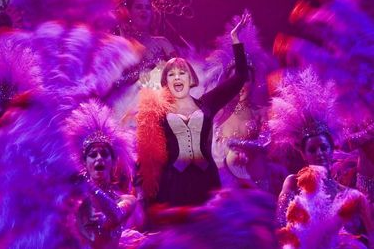 That's not the say the movie doesn't have its moments. They are simply buried under a lot of content that never quite engages. I think there is a surprising lack of emotion here. Daniel Day-Lewis can be a very compelling and easily relatable screen presence, but he seems muted here. Maybe he was not right for the role, but we don't get to feel any real emotion in his turn as Guido until the very end. Likewise, we don't get to spend enough time with a lot of the women in Guido's life to truly get to feel their emotions. They show up, sing a number or two, then walk off the screen. It creates a distant experience, where the audience knows what they're supposed to be feeling, but don't actually feel it. It creates a curious feeling for the audience, where we feel like we're filling in the blanks that the movie should be filling.
That's not the say the movie doesn't have its moments. They are simply buried under a lot of content that never quite engages. I think there is a surprising lack of emotion here. Daniel Day-Lewis can be a very compelling and easily relatable screen presence, but he seems muted here. Maybe he was not right for the role, but we don't get to feel any real emotion in his turn as Guido until the very end. Likewise, we don't get to spend enough time with a lot of the women in Guido's life to truly get to feel their emotions. They show up, sing a number or two, then walk off the screen. It creates a distant experience, where the audience knows what they're supposed to be feeling, but don't actually feel it. It creates a curious feeling for the audience, where we feel like we're filling in the blanks that the movie should be filling.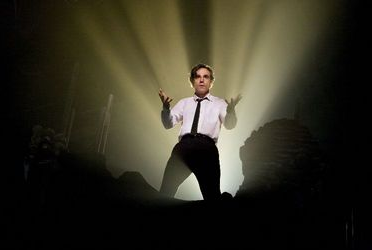 There is one notable exception, and that is Marion Cotillard as Guido's wife, Luisa. Not only is she beautiful to look at and sings very well in her two numbers, but she manages to get us behind her character. Of the various women who walk in and out of Guido's life, she seems to get the most screen time. It's a wonderful performance, and one of the few characters who actually seems to have more than two dimensions. A close second would be Penelope Cruz, who plays a woman who obviously loves Guido, and wants to be more than his mistress. But there's still a distance with her. When she tries to poison herself when Guido rejects her, it does not have the punch that it should. We watch with casualness, when our hearts should be breaking for her.
There is one notable exception, and that is Marion Cotillard as Guido's wife, Luisa. Not only is she beautiful to look at and sings very well in her two numbers, but she manages to get us behind her character. Of the various women who walk in and out of Guido's life, she seems to get the most screen time. It's a wonderful performance, and one of the few characters who actually seems to have more than two dimensions. A close second would be Penelope Cruz, who plays a woman who obviously loves Guido, and wants to be more than his mistress. But there's still a distance with her. When she tries to poison herself when Guido rejects her, it does not have the punch that it should. We watch with casualness, when our hearts should be breaking for her.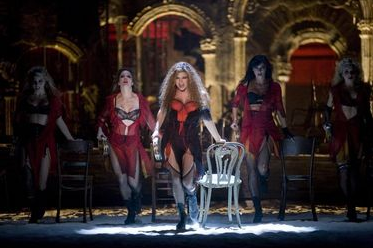
See the movie times in your area or buy the DVD at Amazon.com!






0 Comments:
Post a Comment
<< Home